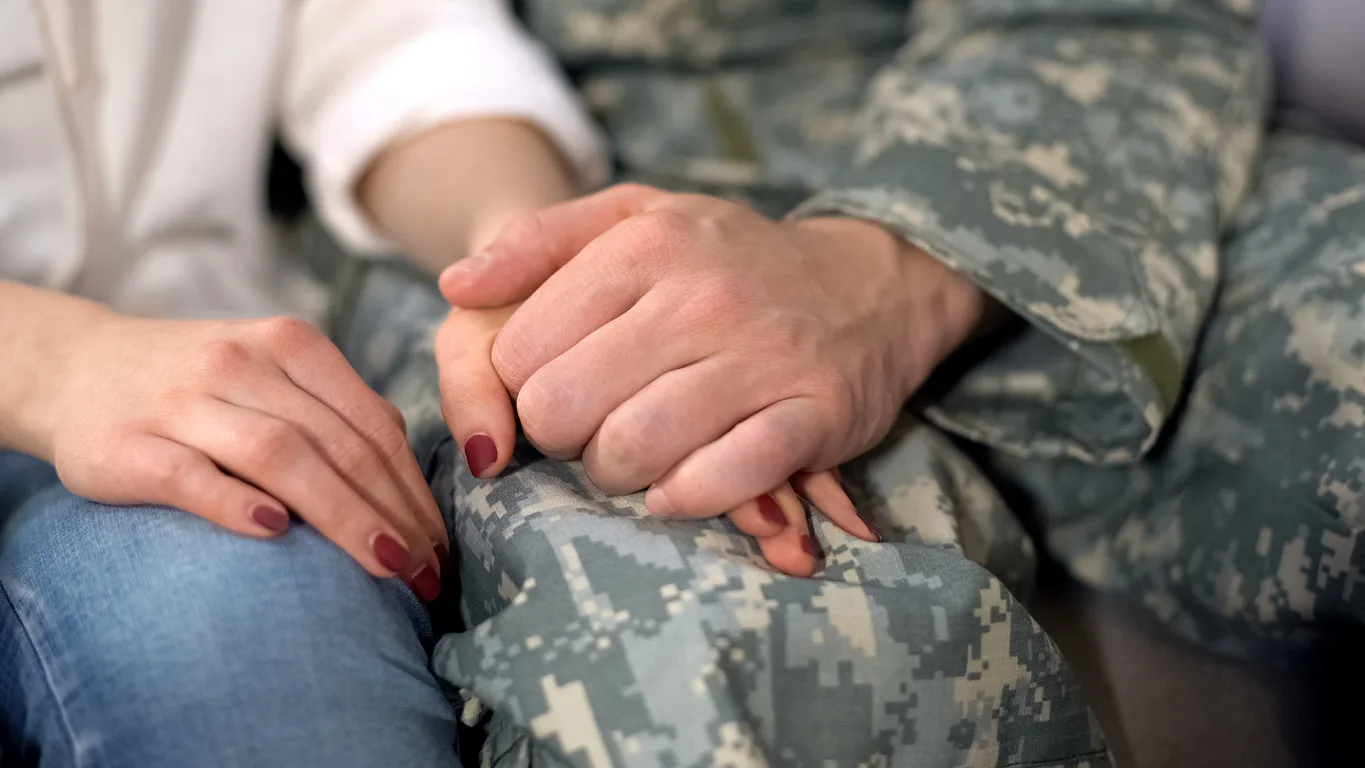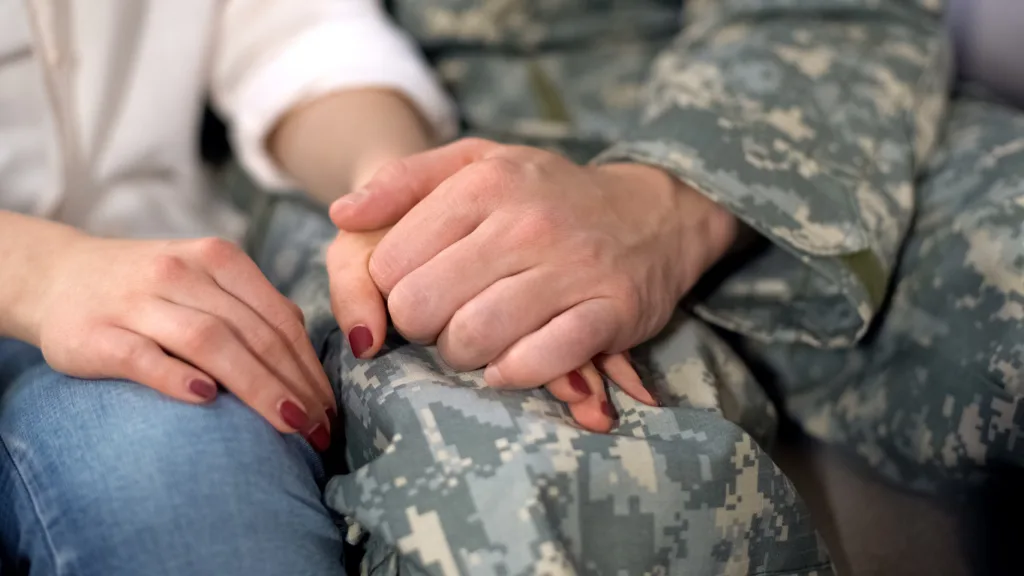Jenna L.* has lived with depression since she was a teenager, but the 38-year-old military spouse found it difficult to manage her symptoms throughout military life.
When she started dating her now-husband in high school, she managed attention deficit/hyperactivity disorder (ADHD) and disordered eating through prescribed medications and consistent visits to her psychiatrist. During his first deployment, Jenna had a job and apartment near her hometown and relied on a strong local support system.
But once they married, her husband received orders to move across the country to San Diego. In a new city without a job or car, Jenna felt lost.“The first few months were really lonely,” she said. “It was a lot to handle, and we were so young. When he deployed again, it caused me to go into a tailspin.”
While her husband was deployed, Jenna gradually learned to navigate the military health system and built a local support network: a full-time job, volunteer activities, a new therapist and friends.
Even with a support system in place, Jenna faced mental health challenges each deployment. “He deployed in 2011 and 2012. That was hard because my closest friend moved away. I slipped back into eating disorder patterns because it was what was familiar,” she said. “I’ve been in and out of recovery my entire adult life.”
Many military spouses and partners share Jenna’s experience with mental health challenges from the stress of military life.
Military spouses experience significant levels of depression and anxiety
According to a study on military spouse mental health, 1 out of 8 military spouses screened positive for a major depressive episode and 1 out of 6 experienced generalized anxiety. These rates are nearly double the general population and are similar to service members after combat.
Tiffany Lange, Psy.D., believes those numbers are an underestimate. “There is hesitancy and stigma in seeking mental health services. Those stigmas are heightened around the military,” she said.
According to Lange, the military’s culture sends the message that all military families are facing similar challenges, so an individual shouldn’t need extra help.
Military culture increases stress levels for military spouses
The stress of military life can also ramp up during deployment, which can harm mental health. One study published in Military Medicine found that deployments can create “deployment stress” in military spouses, which can lead to depression and anxiety.
For example, Jenna said her husband’s deployments caused an increase in stress and feeling alone. “He was always my buffer zone, my safe person. When he is gone, it can be very scary to be alone with your thoughts and I could go to dark places.”
Deployments are not the only major stressors for military spouses and significant others. In fact, one DoD study found that “non-military experiences” — caregiver responsibilities, financial strain, lack of social support and work-family balance — were more likely than deployments to decrease marriage quality, which can have a negative impact on well-being.
The instability and uncertainty of PCS moves can also create mental health challenges for military spouses, especially when a move takes them away from their support network and mental health care providers. The Military Family Advisory Network (MFAN) survey found that military families relocate every 2.5 years on average and experience financial setbacks averaging $5,000 per move.
Lange, whose partner is an active duty Marine, said these moves put a range of responsibilities on partners: inconsistent communications, unique challenges during deployment, and frequent adjustments that come with military life — relocation, career changes, uncertainty of the future and lack of social support.
Mental health services
Military spouses have several options for mental health services
- Mental health services on or off base, through Tricare
- Military OneSource non-medical counseling
- Military Family Life Counselor (MFLC)
- Family Center on military bases
- Cohen Clinics, which offer free counseling
- Mental health services off base
“Individuals can self-refer for Tricare — you do not need a PCM [Primary Care Manager]. You can find a list of available providers on Tricare’s website,” Lange said. “Additionally, Psychology Today gives profiles about mental health providers. Filter for ‘Tricare’ or the specialty of working with military families to find a good fit.”
However, there are real barriers to accessing consistent, quality military health services. One study confirms that availability, accessibility and acceptability all impact military spouses using mental health services. Availability is limited to civilian mental health providers who accept Tricare insurance, which creates limited space and long wait lists. Accessibility is difficult during deployments, especially for spouses who are acting as a solo parent. Finally, mental health treatment is still viewed with a stigma in the military community, where 20% of military spouses believe their choice to seek mental health treatment might negatively impact their service member’s career.
During deployment, spouses who are overwhelmed with responsibilities or caring for young children struggle to make time for mental health appointments. A study from Military Medicine found that only 2 out of 10 spouses used mental health services during a first deployment, and the number is even lower (1.5 out of 10) in between deployments. Although the pre-deployment phase is typically the most stressful, spouses were either unable to get appointments or didn’t prioritize mental health treatment then.
Read how to Make Your Health a Priority While Your Military Partner Is Away >>
PCS moves cause gaps in coverage for therapy or prescription refills. “When preparing for a relocation, have a conversation with your provider to receive medication to cover the time of the move, and try to secure a provider in the new state before the move,” Lange advised. “Sign a release form so the previous provider can release records to the next provider.”
Unmarried significant others: same stress, fewer resources
The military community includes partners and significant others whose lives are influenced by military stressors, even before marriage. However, they have fewer available resources, and are often cut off from military communication or events. Unlike spouses, those dating a service member do not have access to the military base. Many worry about how they would be informed if something happened to the service member, since they have no legal rights and aren’t listed on military paperwork.
“This can leave individuals feeling like they aren’t part of the community, and can contribute to additional loneliness. They handle military life stressors without recognition,” Lange said.
Building strong social support — whether married or unmarried — is a powerful resource to counteract military life stress.
Jenna said her worst deployment was during the pandemic because she couldn’t rely on friends to pull her out of depression, so she increased her medication dosage instead. Her most successful deployment was when she built connections with co-workers, volunteer programs and military spouse groups.
Social connections are not a replacement for therapy or medication, but one study of military spouses reported that social support could significantly reduce the effect of stressful life events.
While virtual communities are popular among military partners, Lange warned against joining toxic groups online: “Technology has expanded our abilities to connect, but quality is more important than quantity to impact loneliness.”
Military life can be stressful, so partners must advocate for their needs and build strong support networks for better mental health.
*Last name withheld to protect privacy.
















